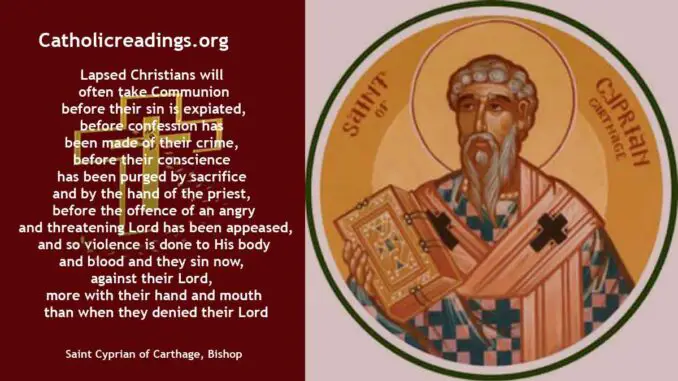St Cyprian, bishop of Carthage was born in 190 AD in Carthage, Tunisia and died as a martyr on September 14 258 AD.
He is known for fighting the Novatian Schism together with St Cornelius, Pope.
We celebrate his feast day jointly together with Saint Cornelius, Pope on September 16 every year in the Catholic Church.
Saint Cyprian of Carthage is second in importance only to the great St Augustine as a figure and Father of the African church.
| Saint Cyprian of Carthage, Bishop Biography | |
|---|---|
 |
|
| Date of Birth | 190 AD |
| Place of Birth | Cathage, Tunisia |
| Profession | Bishop of Carthage |
| Place of Work | Carthage, Tunisia |
| Date of Death | September 14, 258 AD |
| Place of Death | Carthage, Tunisia |
| Feast Day | September 16 |
| Canonization | By Pre-Congregation |
| Patron Saint of | North Africa |
Saint Cyprian of Carthage History
St Cyprian hailed from a rich but pagan family in Carthage. His initial name was Thaschus Cyprianus. When a priest called Caecilius influenced him to convert to Christianity, he took his name, Caecilius and named himself Thaschus Caecilius Cyprianus.
Before he converted to Christianity he was a lawyer, an orator, and a rhetorics teacher in Carthage. He was baptized in 245 AD and gave away some of his material possessions to the poor.
He was ordained a priest one year later in 246 AD. Saint Cyprian says that he felt lost in vanity when he was still a pagan but after baptism, he felt pure, serene, and pristine.
When Donatus, the Bishop of Carthage died, Cyprian was unanimously chosen as bishop by the faithful in 248 A.D. but this did not auger well with the senior members of the clergy in Carthage.
In early 250 AD, Roman Emperor Decius who had risen to power in 249 AD began persecuting Christians. He ordered that all Christians should denounce Christianity and make sacrifices to the pagan gods, failure to which they would face death.
Bishop Cyprian opted to go into hiding as opposed to being killed. When he was later asked why he hid like a coward, he said it was because his time for death had not come, there was work he still had to do for God.
The Christian persecutions under Emperor Decius continued around the Roman Empire, especially in Carthage.
Many Christians were martyred and those who denounced Christ and sacrificed to the pagan gods were spared death and property seizure.
They were referred to as ‘Lapsi’. Bishop Cyprian and most of the clergy postulated that the apostates who wished to come back to the Church should undergo public penance before the Church readmits them.
However, there were some clergy, especially those who opposed his election as bishop, who suggested that no public penance by the lapsi was necessary before readmission to the Church.
Further afield in Rome, there was another school of thought, advanced by antipope Novatian which said that no lapsi should be readmitted to the Church even after penance.
After Bishop Cyprian was absent for 14 months from Carthage, those few rebellious priests readmitted many apostates back to the Church without the express permission of the Bishop.
When he came back to Carthage he took the middle position between readmission without penance and the stance by Novatian of non-readmission.
He, with support from Pope Cornelius, declared that the lapsi would be readmitted to the Church only after they repented.
Thereafter the rebellious clergy in the Church who refused the declaration of Bishop Cyprian and Pope Cornelius elected Novatian as bishop of Rome (first antipope) and Maximus as a rival bishop of Carthage.
However, they were excommunicated from the Church. But Bishop Cyprian’s good deeds during the plague began to thaw away the strained relationship between him and his congregants.
In 256 AD, a new wave of Christian persecutions began in Roman Empire now under Emperor Valerian. Bishop Cyprian, having known what awaits him and his congregants, prepared them spiritually and psychologically for the forthcoming persecutions.
When his time came to face the Roman official in charge, he refused to sacrifice to the pagan gods and maintained his faith in Jesus Christ.
Consequently, he was banished from Carthage to Curubis, (modern-day Korba) in Tunisia where he continued comforting his congregant through inspirational letters. One year later, he was recalled back to Carthage for trial and kept like a prisoner in his own house.
Saint Cyprian’s Death
As time went by, more severe punishment was introduced to the Christians who refused to sacrifice to the pagan gods.
The death sentence was the way to go and therefore Saint Cyprian was taken to trial. When the verdict was read, he was sentenced to death and therefore he was killed with a sword in public and died as a martyr on September 14, 258 AD.
Relics
The faithful took Saint Cyprian’s body and buried it privately. Five Hundred years later, the officials of Charlemagne (King Charles the Great), transferred his relics to France
Feast Day
We celebrate Saint Cyprian’s feast day jointly together with Saint Cornelius, Pope on September 16 every year in the Catholic Church.
Today’s St Cyprian of Carthage Quote
Lapsed Christians will often take Communion before their sin is expiated, before confession has been made of their crime, before their conscience has been purged by sacrifice and by the hand of the priest, before the offense of an angry and threatening Lord has been appeased, [and so] violence is done to His body and blood and they sin now, against their Lord, more with their hand and mouth than when they denied their Lord.
Related Links
Powered By SEO Experts
Follow @ReadingCatholic
